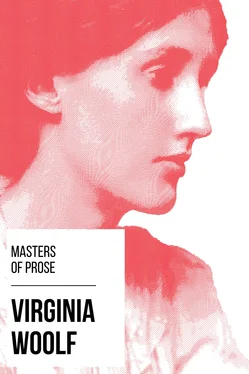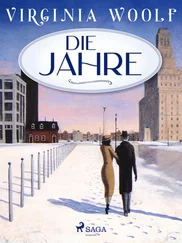'Sir Nicholas!' she exclaimed. For she was made aware intuitively by something in his bearing that the scurrilous penny-a-liner, who had lampooned her and many another in the time of Queen Elizabeth, was now risen in the world and become certainly a Knight and doubtless a dozen other fine things into the bargain.
With another bow, he acknowledged that her conclusion was correct; he was a Knight; he was a Litt.D.; he was a Professor. He was the author of a score of volumes. He was, in short, the most influential critic of the Victorian age.
A violent tumult of emotion besieged her at meeting the man who had caused her, years ago, so much pain. Could this be the plaguy, restless fellow who had burnt holes in her carpets, and toasted cheese in the Italian fireplace and told such merry stories of Marlowe and the rest that they had seen the sun rise nine nights out of ten? He was now sprucely dressed in a grey morning suit, had a pink flower in his button-hole, and grey suede gloves to match. But even as she marvelled, he made another bow, and asked her whether she would honour him by lunching with him? The bow was a thought overdone perhaps, but the imitation of fine breeding was creditable. She followed him, wondering, into a superb restaurant, all red plush, white table-cloths, and silver cruets, as unlike as could be the old tavern or coffee house with its sanded floor, its wooden benches, its bowls of punch and chocolate, and its broadsheets and spittoons. He laid his gloves neatly on the table beside him. Still she could hardly believe that he was the same man. His nails were clean; where they used to be an inch long. His chin was shaved; where a black beard used to sprout. He wore gold sleeve-links; where his ragged linen used to dip in the broth. It was not, indeed, until he had ordered the wine, which he did with a care that reminded her of his taste in Malmsey long ago, that she was convinced he was the same man. 'Ah!' he said, heaving a little sigh, which was yet comfortable enough, 'ah! my dear lady, the great days of literature are over. Marlowe, Shakespeare, Ben Jonson--those were the giants. Dryden, Pope, Addison--those were the heroes. All, all are dead now. And whom have they left us? Tennyson, Browning, Carlyle!'--he threw an immense amount of scorn into his voice. 'The truth of it is,' he said, pouring himself a glass of wine, 'that all our young writers are in the pay of the booksellers. They turn out any trash that serves to pay their tailor's bills. It is an age', he said, helping himself to hors-d'oeuvres, 'marked by precious conceits and wild experiments--none of which the Elizabethans would have tolerated for an instant.'
'No, my dear lady,' he continued, passing with approval the turbot au gratin, which the waiter exhibited for his sanction, 'the great days are over. We live in degenerate times. We must cherish the past; honour those writers--there are still a few left of 'em--who take antiquity for their model and write, not for pay but--' Here Orlando almost shouted 'Glawr!' Indeed she could have sworn that she had heard him say the very same things three hundred years ago. The names were different, of course, but the spirit was the same. Nick Greene had not changed, for all his knighthood. And yet, some change there was. For while he ran on about taking Addison as one's model (it had been Cicero once, she thought) and lying in bed of a morning (which she was proud to think her pension paid quarterly enabled him to do) rolling the best works of the best authors round and round on one's tongue for an hour, at least, before setting pen to paper, so that the vulgarity of the present time and the deplorable condition of our native tongue (he had lived long in America, she believed) might be purified--while he ran on in much the same way that Greene had run on three hundred years ago, she had time to ask herself, how was it then that he had changed? He had grown plump; but he was a man verging on seventy. He had grown sleek: literature had been a prosperous pursuit evidently; but somehow the old restless, uneasy vivacity had gone. His stories, brilliant as they were, were no longer quite so free and easy. He mentioned, it is true, 'my dear friend Pope' or 'my illustrious friend Addison' every other second, but he had an air of respectability about him which was depressing, and he preferred, it seemed, to enlighten her about the doings and sayings of her own blood relations rather than tell her, as he used to do, scandal about the poets.
Orlando was unaccountably disappointed. She had thought of literature all these years (her seclusion, her rank, her sex must be her excuse) as something wild as the wind, hot as fire, swift as lightning; something errant, incalculable, abrupt, and behold, literature was an elderly gentleman in a grey suit talking about duchesses. The violence of her disillusionment was such that some hook or button fastening the upper part of her dress burst open, and out upon the table fell 'The Oak Tree', a poem.
'A manuscript!' said Sir Nicholas, putting on his gold pince-nez. 'How interesting, how excessively interesting! Permit me to look at it.' And once more, after an interval of some three hundred years, Nicholas Greene took Orlando's poem and, laying it down among the coffee cups and the liqueur glasses, began to read it. But now his verdict was very different from what it had been then. It reminded him, he said as he turned over the pages, of Addison's "Cato". It compared favourably with Thomson's "Seasons". There was no trace in it, he was thankful to say, of the modern spirit. It was composed with a regard to truth, to nature, to the dictates of the human heart, which was rare indeed, in these days of unscrupulous eccentricity. It must, of course, be published instantly.
Really Orlando did not know what he meant. She had always carried her manuscripts about with her in the bosom of her dress. The idea tickled Sir Nicholas considerably.
'But what about royalties?' he asked.
Orlando's mind flew to Buckingham Palace and some dusky potentates who happened to be staying there.
Sir Nicholas was highly diverted. He explained that he was alluding to the fact that Messrs -- (here he mentioned a well-known firm of publishers) would be delighted, if he wrote them a line, to put the book on their list. He could probably arrange for a royalty of ten per cent on all copies up to two thousand; after that it would be fifteen. As for the reviewers, he would himself write a line to Mr --, who was the most influential; then a compliment--say a little puff of her own poems--addressed to the wife of the editor of the -- never did any harm. He would call --. So he ran on. Orlando understood nothing of all this, and from old experience did not altogether trust his good nature, but there was nothing for it but to submit to what was evidently his wish and the fervent desire of the poem itself. So Sir Nicholas made the blood-stained packet into a neat parcel; flattened it into his breast pocket, lest it should disturb the set of his coat; and with many compliments on both sides, they parted.
Orlando walked up the street. Now that the poem was gone,--and she felt a bare place in her breast where she had been used to carry it--she had nothing to do but reflect upon whatever she liked--the extraordinary chances it might be of the human lot. Here she was in St James's Street; a married woman; with a ring on her finger; where there had been a coffee house once there was now a restaurant; it was about half past three in the afternoon; the sun was shining; there were three pigeons; a mongrel terrier dog; two hansom cabs and a barouche landau. What then, was Life? The thought popped into her head violently, irrelevantly (unless old Greene were somehow the cause of it). And it may be taken as a comment, adverse or favourable, as the reader chooses to consider it upon her relations with her husband (who was at the Horn), that whenever anything popped violently into her head, she went straight to the nearest telegraph office and wired to him. There was one, as it happened, close at hand. 'My God Shel', she wired; 'life literature Greene toady--' here she dropped into a cypher language which they had invented between them so that a whole spiritual state of the utmost complexity might be conveyed in a word or two without the telegraph clerk being any wiser, and added the words 'Rattigan Glumphoboo', which summed it up precisely. For not only had the events of the morning made a deep impression on her, but it cannot have escaped the reader's attention that Orlando was growing up--which is not necessarily growing better--and 'Rattigan Glumphoboo' described a very complicated spiritual state--which if the reader puts all his intelligence at our service he may discover for himself.
Читать дальше











